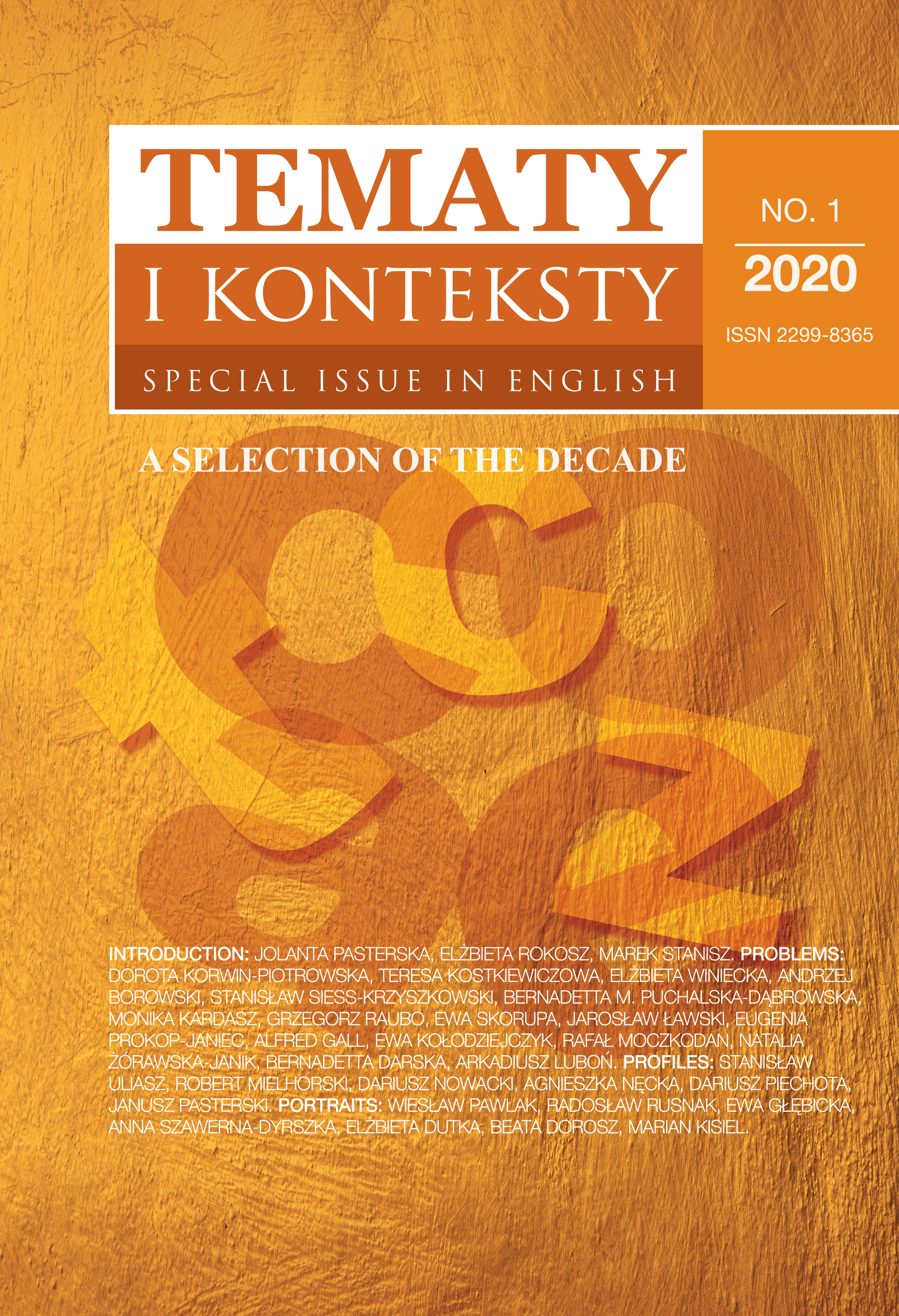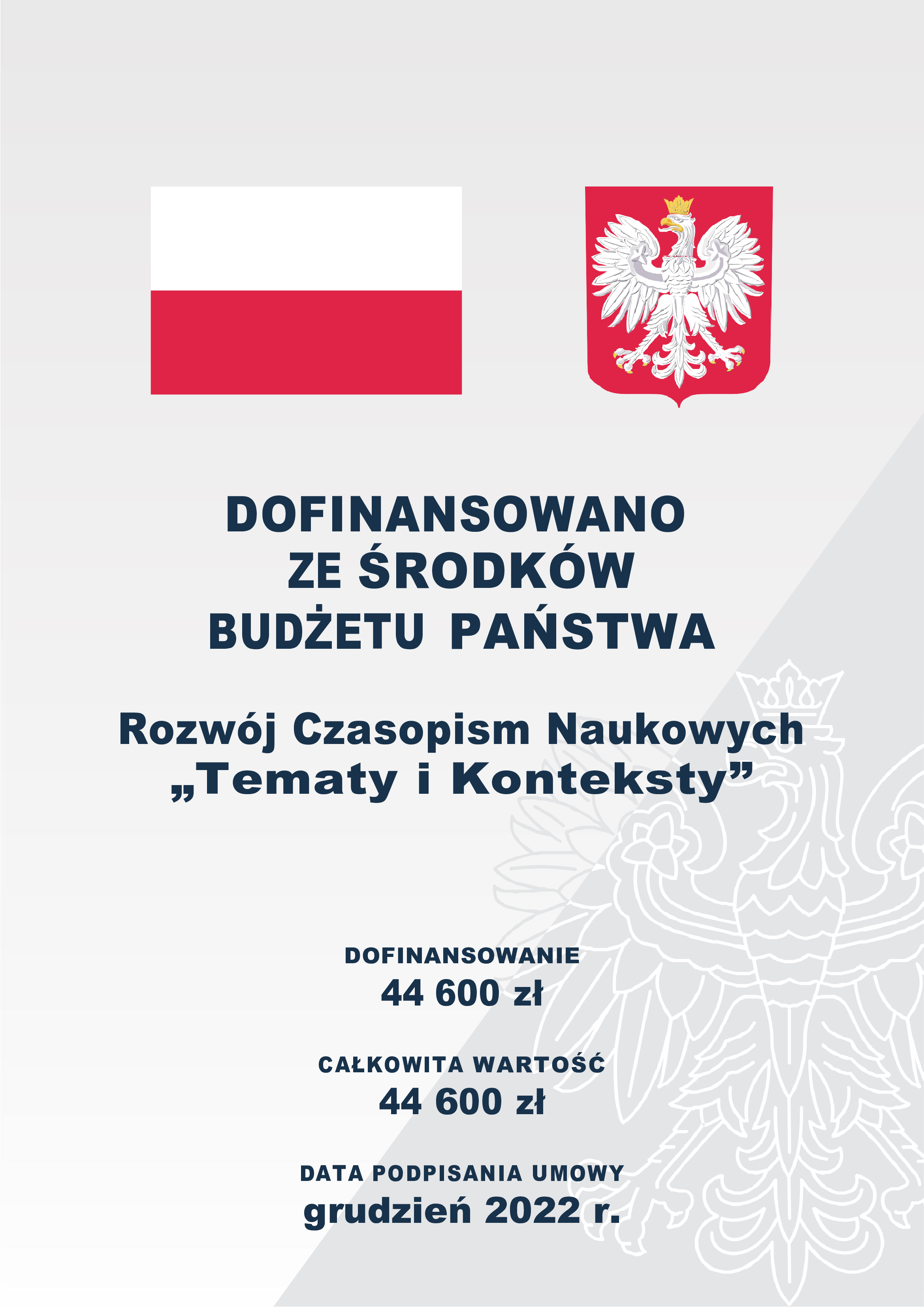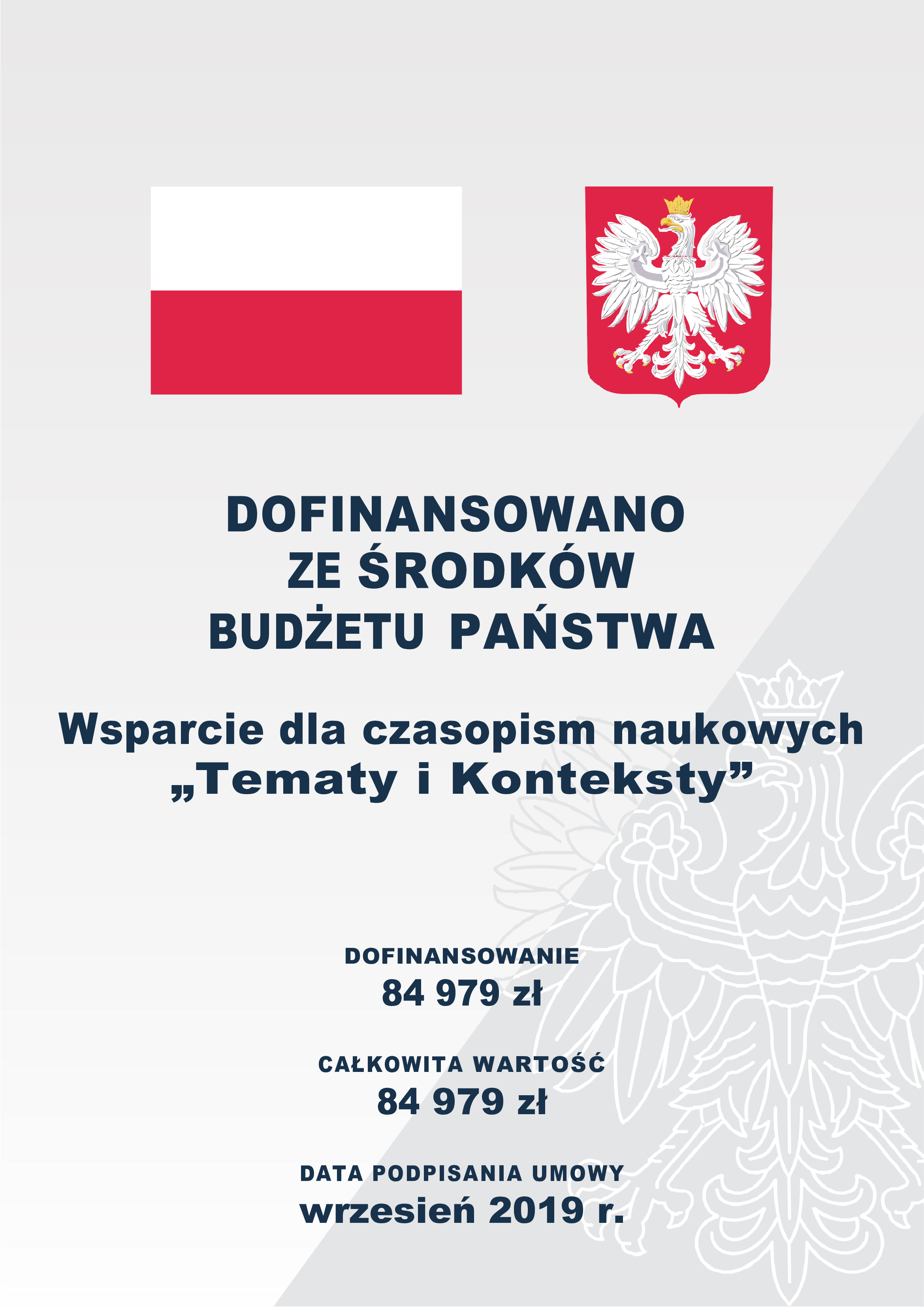Bezoar z łez ludzkich czasu powietrza morowego by Walenty Bartoszewski as an Example of “A Prescription for the Soul and the Body” at the Time of the Plague
DOI:
https://doi.org/10.15584/tik.spec.eng.2020.7Słowa kluczowe:
lyric song, religious poetry, Jesuit poetry, plague,, bezoarAbstrakt
The article is an attempt to interpret a hardly known collection of poems by Walenty Bartoszewski, a Jesuit in Vilnius, published in reaction to the outbreak
of the plague in Vilnius in the years 1629–1632, which constitutes the testimony of increased religiousness in the face of an epidemic. In the article, the author of the collection is presented, as well as his poetic oeuvre. Also, a brief description of the social background of those events is given. Then, other texts from the 16th–18th centuries, concerned with the topic of the epidemic are characterized. They include sermons, secular works, religious songs and prayers. The main part of the article is devoted to the interpretation of the collection by Bartoszewski in the context of the most important aspects of the volume Bezoar z łez ludzkich czasu powietrza morowego [Bezoar of Human Tears Shed at the Time of the Plague], which include: the manifestation of religiousness at the beginning of the 18th century, the realities of the epidemic depicted in lyrics, the vision of God and Christ, ways of protecting the faithful against the plague, and the intercession of the Mother of God.
Downloads
Bibliografia
Bartoszewski W., Bezoar z łez ludzkich czasu powietrza morowego […], Wilno, 1630.
Bartoszewski W., Tęcza przymierza wiecznego. Jezus Chrystus ukrzyżowany […], Wilno, 1633.
Błoński J., Mikołaj Sęp Szarzyński a początki polskiego baroku, Kraków: Towarzystwo Autorów i Wydawców Prac Naukowych “Universitas,” 2001.
Brewiarz.pl, Święty Roch, http://www.brewiarz.pl/czytelnia/swieci/08-16b.php3 (dostęp: 20.01.2014).
Grün A. OSB, Krzyż. Symbol odkupionego człowieka, translated by M. Ruta, Kraków: Wydawnictwo WAM, 1998.
Grzebień L., “Bartoszewski, Bartoszewicz, Jan SJ,” in: Encyklopedia katolicka, edited by F. Gryglewicz, Vol. 2, Lublin: Towarzystwo Naukowe Katolickiego Uniwersytetu Lubelskiego, 1976, p. 87.
Jelicz A., Życie codzienne w średniowiecznym Krakowie (wiek XIII–XV), Warszawa: Państwowy Instytut Wydawniczy, 1966.
Karpiński A., W walce z niewidzialnym wrogiem. Epidemie chorób zakaźnych w Rzeczypospolitej w XVI–XVIII wieku i ich następstwa demograficzne, społeczno-ekonomiczne i polityczne, Warszawa: “Neriton,” Instytut Historii PAN, 2000.
Klonowic S.F., Hebdomas, to jest Siedm tegodniowych piosnek, edited by M. Mejor, E. Wojnowska, Warszawa: “Neriton,” 2010.
Korolko M., “Pieśń religijna,” in: Słownik literatury staropolskiej, edited by T. Michałowska in collaboration with B. Otwinowska, E. Sarnowska-Temeriusz, Wrocław: Zakład Narodowy im. Ossolińskich, 2002, pp. 651–659.
Kracik J., Chrześcijaństwo kontra magia. Historyczne perypetie, Kraków: Wydawnictwo M, 2012.
Kracik J., Pokonać czarną śmierć. Staropolskie postawy wobec zarazy, Kraków: Wydawnictwo M, 1991.
Kraszewski J.I., Wilno od początków jego do roku 1750, Vol. 1, Vilnius 1840.
Lenart M., Spór Duszy z Ciałem i inne wierszowane spory w literaturze staropolskiej na tle tradycji średniowiecznej, Opole: Wydawnictwo Uniwersytetu Opolskiego, 2002.
Mazurkiewicz R., Deesis. Idea wstawiennictwa Bogarodzicy i św. Jana Chrzciciela w kulturze średniowiecznej, Kraków: Towarzystwo Autorów i Wydawców Prac Naukowych “Universitas,” 2012.
Namaczyńska S., Kronika klęsk elementarnych w Polsce i w krajach sąsiednich w latach 1648–1696, Vol. 1: Zjawiska meteorologiczne i pomory, Lwów–Warszawa, 1937.
Niedźwiedź J., Kultura literacka Wilna (1323–1655). Retoryczna organizacja miasta, Kraków: Towarzystwo Autorów i Wydawców Prac Naukowych “Universitas,” 2012.
Nieznanowski S., “Kancjonał,” in: Słownik literatury staropolskiej, edited by T. Michałowska in collaboration with B. Otwinowska, E. Sarnowska-Temeriusz, Wrocław: Zakład Narodowy im. Ossolińskich, 2002, pp. 364–366.
Nowak-Dłużewski J., Okolicznościowa poezja polityczna w Polsce. Zygmunt III, Warszawa: Instytut Wydawniczy “Pax,” 1971.
Nowicka-Jeżowa A., Pieśni czasu śmierci. Studium z historii duchowości XVI–XVIII wieku, Lublin: Towarzystwo Naukowe Katolickiego Uniwersytetu Lubelskiego, 1992.
Okoń J., Dramat i teatr szkolny. Sceny jezuickie XVII wieku, Wrocław: Zakład Narodowy im. Ossolińskich – Wydawnictwo PAN, 1970.
Papée F., Święty Kazimierz, królewicz Polski, Lwów: nakładem Macierzy Polskiej, 1902.
Pawlak W., Wielcy kaznodzieje Krakowa, edited by K. Panuś, Kraków: Wydawnictwo “UNUM,” 2006.
Powodowski H., Recepta duszna i cielesna przeciw powietrzu morowemu […], Poznań, 1589.
Przedziwna Matka Stworzyciela Swego. Antologia dawnej polskiej poezji maryjnej, selected, edited and prefaced by R. Mazurkiewicz, Warszawa: Wydawnictwo Księży Marianów MIC, 2008.
Rosiński F.M., “Aniołowie w Nowym Testamencie,” in: Anioł w literaturze i kulturze, Vol. 2, edited by J. Ługowska, Wrocław: Oficyna Wydawnicza Atut – Wrocławskie Wydawnictwo Oświatowe, 2005, pp. 13–33.
Wielki słownik medyczny, edited by J. Komender, Warszawa: Wydawnictwo Lekarskie PZWL, 1996.
Ziomek J., Renesans, Warszawa: Wydawnictwo Naukowe PWN, 1999.
Pobrania
Opublikowane
Jak cytować
Numer
Dział
Licencja
Prawa autorskie (c) 2021 Tematy i Konteksty

Utwór dostępny jest na licencji Creative Commons Uznanie autorstwa – Użycie niekomercyjne – Bez utworów zależnych 4.0 Międzynarodowe.




